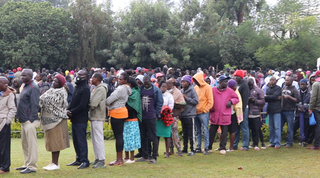News
Voter Apathy — Especially Among the Young — Threatens Democracy in Africa
Since the 1990s, the number of African democracies has fallen to just eight in 2022, with 41% of Africa's 54 countries classified by Freedom House as 'partly free' and 44% as 'not free'.

Competitive and participatory elections are the key institution of contemporary liberal democracy where the right of the people to self-government may be exercised. Thus, voter turnout is a crucial gauge of a democracy's health. It is a good gauge of the level of confidence that citizens have in their political institutions and leaders. Voter apathy suggests a lack of faith in political institutions and the administration.
Despite the importance of elections as an instrument of democracy, voter turnout has been on the decline globally since the 1990s and, in recent times, democracy in Africa has slipped backwards.
Since the 1990s, the number of African democracies has fallen to just eight in 2022, with 41% of Africa's 54 countries classified by Freedom House as “partly free” and 44% as “not free”.
In Mauritius, a flawed election in 2019 withered citizens' confidence in the strength of their democracy, coups in Mali and Guinea and attempted coups in Gabon and Niger have also detracted from the trend, and in other places like South Africa, a regional economic powerhouse, corruption has fuelled deepening dissatisfaction.
Yet, all is not lost.
In the most recent Afrobarometer survey, most respondents from the 34 African countries surveyed said they preferred democracy over any other form of government, although one may find that how people define and envision democracy may vary from person to person.
Democracy, with its features of freedom of speech, freedom of the press, competition, parliamentary supervision — coupled with institutional checks and balances — is generally considered to be the most feasible framework for governance and accountability. There is, at least, the prospect of a change in leadership if the ideas and management of existing leaders fail to yield good results.
Some gains
Gains in places like Kenya (2017) and Malawi (2019) where the courts have issued landmark rulings to preserve faith in democratic institutions must not go unnoticed.
Zambia's recent change of the ruling party, and Gambia, Sudan and Zimbabwe giving the boot to their long-reigning autocrats are equally noteworthy and demonstrative of Africans' continued preference for more democratic and accountable governance than they believe they are now receiving, although these countries are yet to exit the grip of authoritarianism.
More precise metrics appear to confirm the public's commitment to democracy, even though lower than the 73% from a decade ago. Authoritarian options are regularly rejected by sizeable and stable majorities options: military control (75%), one-party rule (77%) and one-person rule (82%).
Nevertheless, this trend of “democracy fatigue”, especially among young people, is telling of the failures of the political system to deal with complex problems and cater to the needs of the population.
Understanding the electoral process in Africa
The electoral process in Africa varies from country to country, with most countries using some form of the proportional representation system. For example, proportional representation ensures that parties get members of parliament (MPs) according to their portion of the vote. This system, while allocating MPs more accurately, lacks the accountability of a constituency-based system where people at local level can reject an MP for failing to deliver improvement.
The downside of proportional representation is that parties — not constituencies of voters — decide who gets to go to parliament. In South Africa this is believed to have contributed to falling interest in participating in elections.
The downside of the constituency-based system is that a dominant party can gerrymander the borders of constituencies to make its candidates more likely to win.
The electoral process in Africa is complex and involves various stakeholders and stakeholder groups. It often starts with the registration of voters and parties and the nomination of candidates. This is followed by a campaign period where the candidates campaign for their respective parties. The campaigning period usually lasts for about three months before voting day. Then, on voting day, citizens must cast their votes at designated polling stations and await the results, usually announced between 24 hours and one week, or after voting has ended.
There are several problems with voting in Africa. One is that there are not enough polling stations for all the voters, so many people have to stand in queues in extreme temperatures for hours just waiting to cast their vote. This comes at the expense of other productive day's activities, including work. People who run small, informal businesses depend on their daily trade to put food on the table.
There is also the issue that elections are not always fair and free, and the process sometimes lacks transparency and is prone to fraud. While voting may take place in a free and fair atmosphere, the tallying of the final result often occurs with less transparency, leading to contestations of the outcome by losing parties, as has just occurred in Kenya and Angola.
Distrust in the process
These problems have, over time, led to a lack of trust in the electoral process in most places, the result of which is increasingly showing in low voter turnout and, in turn, voter apathy.
There are many other reasons for voter apathy, including a lack of knowledge about the voting process, a lack of knowledge about the candidates or issues, a lack of understanding about how voting affects them personally, inability to access polling stations due to distance or transportation costs, the lack of trust in the democratic process, feeling that one's vote won't make a difference, or just not being interested in politics or the electoral process.
Kenyan voter indifference
In Kenya, fewer young people signed up to vote in the August 2022 elections compared with 2017 — a drop of 5.27%. This time, about 40% of those registered to vote were between the ages of 18 and 35. A concern is that the decline in young people's registration reflects a broader trend of voter indifference among Kenyans, where only 2.5 million new voters were added to the 2022 election voter register, as opposed to the six million target by the IEBC.
The overall turnout in this year's election fell just under 65%, concerning (though not unusual given the trend) for a country that recorded 78% in August 2017 and 86% in March 2013.
The main worry, though, is that the trend will extend deeper into its increasingly young demographic — 75% of whom are under 35 years old and thus posing a major threat to participative governance in the immediate future.
But, there are reasons for this decline, especially in this election.
For some, the polls offered nothing spectacular or incredibly life-altering options. “Voters,” says XN Iraki, Associate Professor, Faculty of Business and Management Sciences, University of Nairobi, “show up to vote for a cause.”
When they don't, it's equally a statement about the options on offer. What does one do when the options are not desirable? Is the answer really the least of the two? If there's anything to learn from the US in the very recent past, it is that tremendous harm can be done with the wrong pilot, even in a short period and when the option to vote them out exists.
At a time when the state of the economy is a priority (over ethnic tensions), it is also possible that the economic proposals of Kenya's presidential contenders lacked merit, given the lack of clear pathways to achieving them. Africa's young, for example, account for 60% of the continent's unemployed, with their unemployment rate often being more than twice as high as that of adults. They are also, according to the African Development Bank, disproportionately economically marginalised and disadvantaged.
In such circumstances, persuading a population bent on fending for itself while still bogged down by a rapidly shifting and seemingly more complex world than in previous times, requires more than lofty goals.

Added here is the belief that the reward for voting is often not reflected in “who gets to eat” in Kenya. Real or perceived, historical precedents in which backroom boardroom deals determine key political actors have left a jarring impression on many who believe their votes are or will be worthless and thus not worth the hassle.
It didn't help either that the youth (much like Ghana's, South Africa's and elsewhere on the continent) are troubled by politicians who are seen to be corrupt, lack political integrity, and care less about their electorates than they do themselves and their careers. The temptation to forsake the majority and rely on extorting rents is constant for politicians, and especially worse for those who are apathetic about the benefits of democracy.
Historically and more broadly, African politicians have often shown little interest in outlining their development priorities to their constituents. Due to a weakened democracy and democratic institutions and, in certain cases, an explosive mix of race, religion, and language, voters have allowed politicians to get away with this self-serving kind of politics without suffering the consequences of their failure to deliver.
Steps to be taken
While the context around voter apathy will vary based on the domestic political economy and the power dynamics at play between the state, elites and the electorate, there are general steps that can be taken to identify the root causes of this problem and find solutions to addressing it.
One way to counter voter apathy is by providing more information about the election process and the candidates running for office. There is a need for voter education, not just on who to vote for but also why to engage in political processes at all. The usefulness of elections as a medium to address national and subnational issues, and most importantly, to influence ideas and hold elected officials responsible is key. This will help voters make more informed decisions about who they want to vote for before they head to the polls on election day.
Systems that encourage and reinforce the right to choose are critical to developing a more participative form of governance. At the same time, it is important to recognise that citizens are weary of the objectives of many parties because of the trauma of politics in governance.
The extent to which they will deem institutions as trustworthy and legitimate will be reflective of whether or not these institutions genuinely care about their aspirations, including being unafraid to say when things are right and when they are wrong. Here, donors can for instance prove to be a force for good by supporting and enabling those institutions that engage in civic education to carry out their duties while choosing to stay impartial, without fear of being penalised.
Africa is an enormous continent with a population of over a billion people. It is home to some of the world's fastest-growing economies and has the youngest population. The continent has the most unequal distribution of wealth globally, and this inequality is increasing.
Inequality can have a detrimental effect on democracy. In highly unequal societies, the elite have a tendency to defend a political and policy environment that supports their interests and strengthens their status. Therefore, it is not surprising that the quality of democracy in Africa has also been declining, and the continent has been experiencing a democratic deficit in recent years.
The challenge for the continent will thus be how to deal with its diversity, geographic size and rapid development, while continuing to uphold democratic values.
In a world where people are checked out of electoral processes and populist governments seem to be gaining popularity, it is important to find ways to increase participation in the interim, however imperfect democracy may be.
A lot more effort needs to be put into building stronger systems of accountability to ensure that the options offered in democratic systems, for as long as we subscribe to them, can be exercised in the interests of the many, not the few.
This will require hard work, but we know now, perhaps more than ever, that “the easy choice” is not in the interests of many. All the choices needed to get Africa on a path that improves lives and livelihoods will be hard (read not business-as-usual).
This article originally appeared on the Daily Maverick


